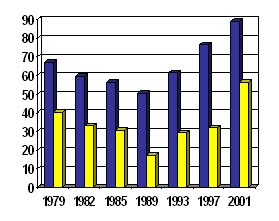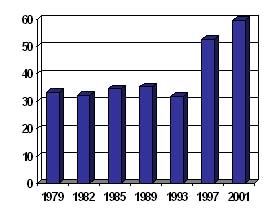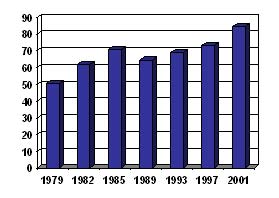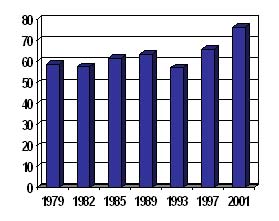
The 2003 Post-Collegiate Life Survey of Graduates
of
|
||||||||||||||||||||||||||||||||||||||||||||||||||||||||||||||||||||||||||||||||||||||||||||
The distribution of current vocational fields in 2003 was: |
||
| Hobart | Wm. Smith | |
| Business | 33% | 13% |
| Homemaker or childcare provider | 1% | 20% |
| Education and academic research | 10% | 19% |
| Administration, management, and personnel work | 16% | 10% |
| Legal and paralegal professions | 8% | 4% |
| Science, computers and engineering fields | 7% | 3% |
| Health care related professions | 6% | 4% |
| Mass media, communications, and entertainment | 3% | 5% |
| Counselor/therapist/clergy | 2% | 4% |
| Social services, government, and police | 2% | 3% |
| Military | 1% | 0% |
| Public relations and fundraising | 1% | 3% |
| Clerical work | <1% | 1% |
| Skilled labor | 1% | <1% |
| Unskilled labor | 1% | 1% |
| Other | 1% | 2% |
| Unemployed | 2% | 2% |
| Full-time student | 4% | 5% |
Assessments of Academic Experience
1. 96% of HWS graduates say their undergraduate education was a valuable experience enabling them to read, write, and think more clearly in their daily lives. Over half believe it was a "critically important contribution" or the "most important experience" they have had enabling these skills with a sharp rise to over 75% expressing this level of praise among 1997 and 2001 graduates (see Figure 1).
|
Figure 1
|
|
Percent of HWS Graduates Saying Their Undergraduate Experience Was a "Critically Important Contribution" or the "Most Important Experience" They Have Had in Enabling Them to Read, Write, and Think More Clearly |
 |
|
Graduating Cohort |
2. 62% of graduates reported that, as a result of their HWS education, their ability to reason quantitatively was "notably" or "greatly" improved with another 28% saying their ability was slightly improved while 10% thought their ability was "basically unchanged." (There were no appreciable differences among cohorts.)3. 89% of graduates overall and at least 80% of each cohort agree that the interdisciplinary studies offered at HWS were a valuable experience in their intellectual development.
4. About half (49%) of the graduates (60% of women but only 36% of men) thought that the coordinate system dividing HWS into men's and women's colleges was useful in helping them gain a deeper understanding of gender differences (a stable pattern throughout the cohort years).
5. 90% of graduates agree that their HWS education prepared them well for subsequent educational and vocational pursuits. This was a consistent finding with virtually no variation across cohort years.
6. 94% of graduates (over 90% in each cohort) agree that they were "treated fairly and equitably by HWS faculty and administration" during their undergraduate years.
7. Participation in an HWS term abroad program was higher among respondents in more recent cohorts. It rose from 25% in the 1979 cohort to a high of 56% in the 1997 cohort and then dropped off somewhat to 45% in 2001 after the conversion to semesters that required a 15 week program in contrast to the 10 weeks programs under the old trimester system (see Figure 2).
Percent of HWS Graduates Participating in an HWS Term Abroad Program
Graduating Cohort
8. 96% of HWS graduates who studied on an HWS Off-Campus Program say their experience was valuable in developing a perspective on global interdependence and cross-cultural diversity. Two-thirds believe it was a "critically important contribution" or the "most important experience" they have had in developing this perspective with a sharp rise to over 80% expressing this level of praise among 1997 and 2001 graduates (see Figure 3).
Graduating Cohort
9. 85% of graduates agree with the statement that, "regardless of any off-campus program, the rest or my HWS education gave me important skills (practical and otherwise) to live in a diverse world" with little variation across cohorts.
10. The percentages of graduates saying that their HWS education made the following contributions to their lives have all risen sharply among the most recent cohorts:a) "cultivated in me an understanding of the public good and public needs" (see Figure 4);
b) "helped develop a commitment to public service" (see Figure 5);
c) helped them gain an understanding of differences and inequalities of gender, race and class that was helpful in post-collegiate life (see Figure 6);
d) helped them reflect ethically on their actions in post-collegiate life (see Figure 7).
Graduating Cohort
Graduating Cohort
Graduating Cohort
Percent of HWS Graduates Saying Their Undergraduate Experience Helped Them Reflect Ethically on Their Actions in Post-Collegiate Life
Athletics and Learning
Between 38% and 50% of each cohort had participated in intercollegiate athletics (no trend over time). Among participants, between 88% and 93% of student athletes in each cohort indicated that, at least to some extent, their athletic involvement enhanced their learning experience at HWS. Between 40% and 51% of each cohort said it "definitely" enhanced their learning experience.
Residential Campus ExperienceThe pattern of residing on campus has changed significantly over time. The late 1980's was the time of lowest on-campus residence. The most recent cohorts reflect the highest levels of campus residency as new housing for seniors was completed (see figure 8). Between 85% and 89% of each cohort expressed the view that residing on campus was at least somewhat important for their educational experience and personal development and 42% to 51% of each cohort believed it to be "very important" or "one of the most important aspects" of their learning experience.
|
Figure 8
|
|
Percent of HWS Graduates
Residing on Campus for at Least Three Years (dark bar) and
for All Four Years (light bar)
|
 |
|
Graduating Cohort
|
|
|





